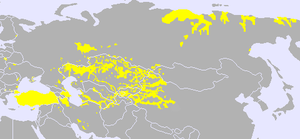الهجرة التوركية

الهجرة التوركية Turkic migration تشير إلى توسع القبائل التوركية في أوروبا والشرق الأوسط، بين القرنين السادس والحادي عشر الميلاديين. The region of origin of the Turks is East Central Asia, Xinjiang, Mongolia and Siberia.
Certainly identified Turkic tribes were known by the 6th century and by the 10th century most of Central Asia was settled by Turkic tribes. The Seljuq dynasty invaded Anatolia starting in the 11th century, ultimately resulting in permanent Turkic settlement there. Meanwhile, other Turkic tribes either ultimately formed independent nations, such as Kyrgyzstan, Turkmenistan, Uzbekistan and Kazakhstan or formed enclaves within other nations, such as Chuvashia. Turkic peoples also survived in their original range, such as the Uyghurs in China and the Sakha Republic of Siberia, as well as in other scattered places of the Far East and Central Asia.
. . . . . . . . . . . . . . . . . . . . . . . . . . . . . . . . . . . . . . . . . . . . . . . . . . . . . . . . . . . . . . . . . . . . . . . . . . . . . . . . . . . . . . . . . . . . . . . . . . . . . . . . . . . . . . . . . . . . . . . . . . . . . . . . . . . . . . . . . . . . . . . . . . . . . . . . . . . . . . . . . . . . . . . .
الأسلاف
The earliest documented Turkic peoples appear as nomadic tribes on the plains of the Far East north of the Great Wall of China, which was constructed as a fortified border essentially between Han dynasty (206 BCE-220 CE) China (though started earlier) and the Xiongnu.
الهون

الأويغور
Later Turkic peoples include the Karluks (mainly 8th century), Uyghurs, Kyrgyz, Oghuz (or Guz, Uz, Ghuzz, etc.) Turks, and Turkmens. As these peoples were founding states in the area between Mongolia and Transoxiana, they came into contact with Muslims, and most gradually adopted Islam. However, there were also some other groups of Turkic people who belonged to other religions, including Christians, Jews (انظر الخزر)، Buddhists, and Zoroastrians.
التركمان
انظر أيضاً
- عصر الهجرات
- Nomadic empire
- Turkic tribal confederations
- تاريخ آسيا الوسطى
- الامبراطورية الهفتالية
- Xionites
- Islamicisation and Turkicisation of Xinjiang.
- غزوات التتار
- Genetic history of the Turkish people
- Haplogroup N-M231
- نظرية الخزر
- Sun Language Theory
- الغزوات والفتوحات المنغولية
- الدولة العثمانية
الهامش
المراجع
- Findley, Carter Vaughnm, The Turks in World History, Oxford University Press: Oxford (2005).
- Holster, Charles Warren, The Turks of Central Asia Praeger: Westport, Connecticut (1993).





